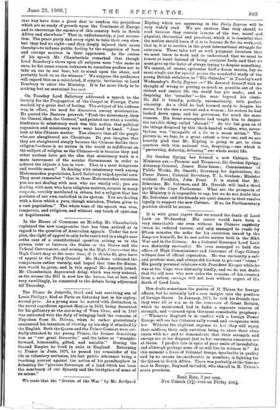We trust that the "Stories of the War " by
Mr. RI:0yard
Kipling which are appearing in the Daily Express will be very widely read. We are anxious that they should be read because they contain lessons of the war, moral and physical, theoretical and practical, which it is essential that the nation should learn if it is to become fit for its work,—if, that is, it is to survive in the great international struggle for existence. These tales tell us with poignant iteration that we must learn to work and to understand that we must be honest at heart instead of being arrogant fools, and that we must give up the habit of always trying to despise something. We cannot, of course, epitomise half-a-dozen stories, but we must single out for special praise the wonderful study of the young British subaltern in "The Outsider" in Tuesday's and Wednesday's Daily Express :—" He devoted himself with no thought of wrong to getting as much as possible out of the richest and easiest life the world has yet made; and to despising the `outsider' — the man beyond his circle. He did it blandly, politely, unconsciously, with perfect sincerity. As a child he had learned early to despise his nurse, for she was a servant and a woman ; his sisters he had looked down upon, and his governess, for much the same reasons. His home atmosphere had taught him to despise the terrible thing called dissent.' " So the list goes on of the things despised by this thick-headed soldier, who, never- theless, was "incapable of a lie or a mean action." The picture is, we fear, to a great extent a true one, and we are heartily glad that Mr. Kipling is going to get to close quarters with this national vice, despising,—one which is "perverting, defacing, debasing" our whole social life.


































 Previous page
Previous page